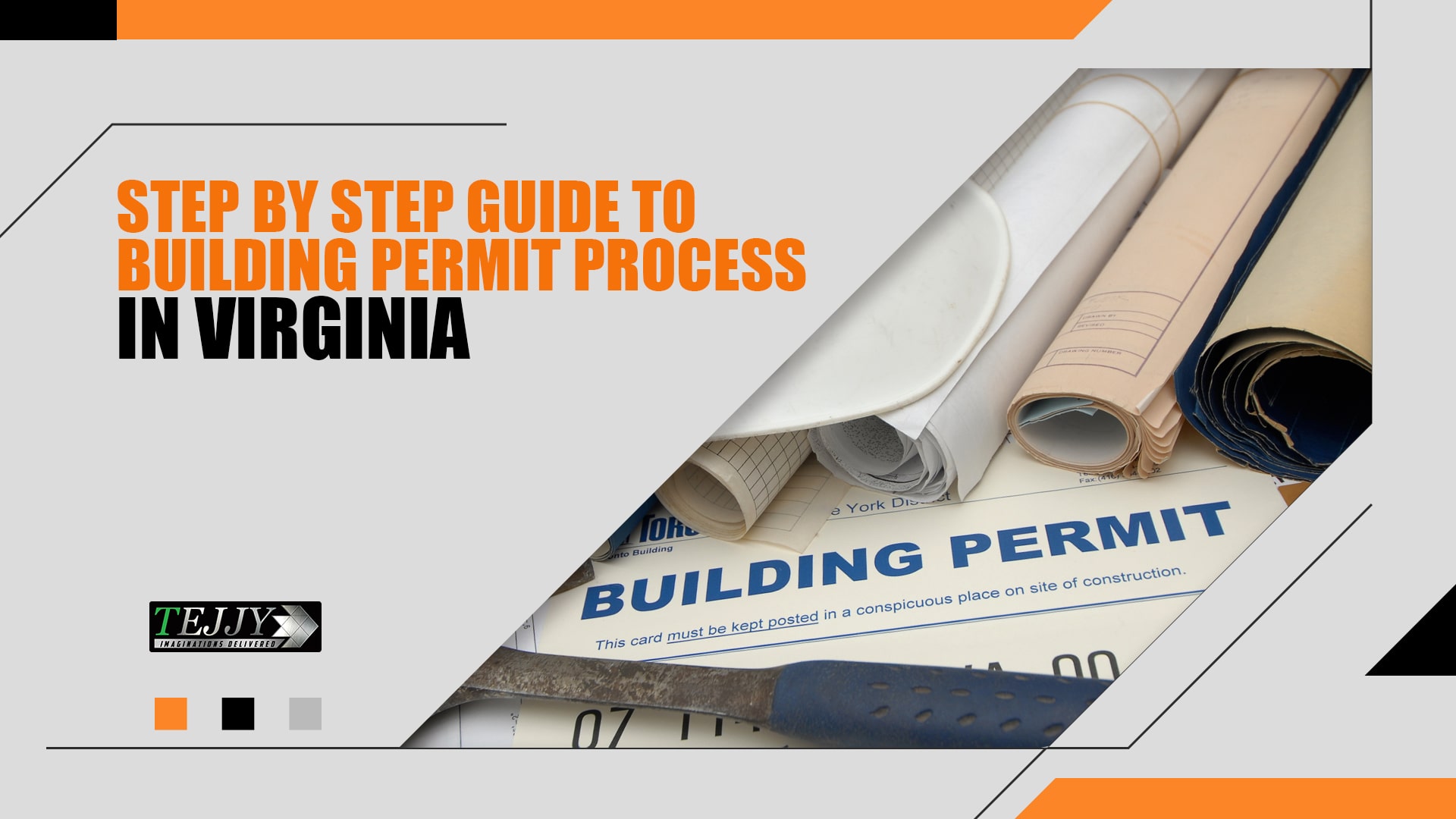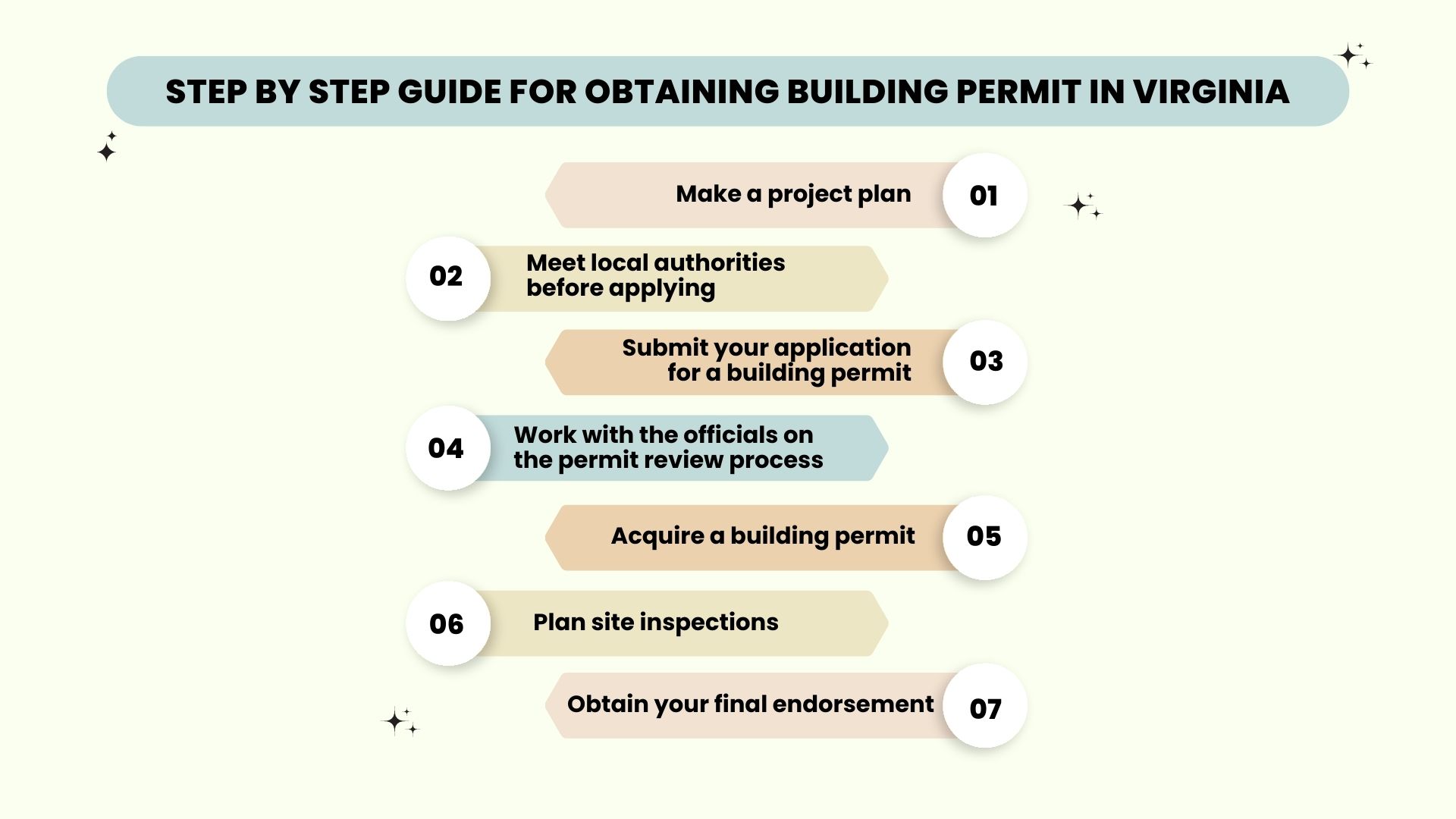Building Permit Process Virginia, USA
The Virginia City and County governments are responsible for issuing building permits. Permitting is often handled by the city, but if the property is in an unincorporated region, you'll need to submit your application to the county.
[edit] In Virginia, what kind of development calls for a building permit?
In Virginia, permit expediting services are typically required for a project that involves the construction of a new structure, the modification of an existing structure, or the demolition of a structure. This involves interior remodeling as well as smaller constructions like decks and sheds. In addition, approval for construction is necessary for the majority of electrical, mechanical, and plumbing work other than the most fundamental repairs. Before starting any construction work, you must obtain consent if that is necessary. In Virginia, individual cities are in charge of handling building permits.
[edit] Where do I go in Virginia to apply for a building permit?
The Virginia City and county governments where you will be doing the construction work are responsible for issuing building permits. Permitting is often handled by the city, but if the property is in an unincorporated region, you'll need to submit your application to the county. Virginia's small communities may also authorize the county to issue permits on their behalf. Inquire at the city permission office about where to submit your application.
[edit] What kinds of details are requested on Virginia construction permit applications?
Since construction laws are set at the local level, the specific information requested on the building permit application in Virginia will vary on the city or county you apply in.
[edit] What will you have to provide to the building authorities?
- Property's address, owner's name and contact information
- Contractor's name, address, and license number
- Estimated construction cost, the intended use of structure and a description of the work to be executed
- Prepared plans depicting the intended construction as well as documentation of any necessary approvals
- Following submission, the application and plan will be examined to determine whether they adhere to regional building requirements, zoning regulations, and safety regulations.
- Next, your application will be accepted and the building permit will be issued, if it does.
[edit] Are construction inspections necessary?
In general, yes. The final certificate of occupancy must be granted once the city or county building inspector has completed inspections on the majority of projects in Virginia. The type of the project will determine how many inspections are required. When your approval is granted, you will be given a list of the required inspections and their timeline. You are in charge of ensuring that all inspections are scheduled as necessary.
[edit] Complete Guide to Building Permit Process:
A building permit essentially provides you with the go-ahead to execute a construction or remodeling project on your property with the help of a local government agency. It guarantees that your project conforms to regional safety regulations for building, zoning, and land use. Don't worry if you're unclear about the procedure for obtaining approval.
- Your home's structural soundness, zoning, sewer and sanitation, water lines, fire protection, and electrical work are all covered by the building permit process.
- Remember that there are different permissions for commercial and residential development.
- Depending on your geographic location, type of permission requested, type of work to be done, the intricacy of the plan, and the workload in the office, the processing time for approval varies.
- While the inspector may grant some approvals right away, others that need a plan approval may take anywhere between 1 and 30 days.
[edit] What kind of house improvements need a building permit?
Not all constructions require approval. Your local building code will determine if a permit is required for your home improvement project. Projects that alter the layout or use of your home are typically the ones that call for approval. Alternatively, your structure may have the potential to produce a dangerous atmosphere.
[edit] Projects that require a building permit expediter:
- Re-piping your home
- Roof replacement
- Demolition of a component of your home
- Changing or expanding roof lines
- Adding or removing load-bearing walls
- Changing the purpose of a space like turning a garage into a living room
[edit] Projects that do not require approval from building authorities:
- Painting the house
- Installing kitchen cabinets
- Replacing standard kitchen equipment
- Repaving the driveway
- Putting in floor coverings
- Erecting a small fence
Additionally, you may want special system permits, such as mechanical permission to install a central air conditioning system or a plumbing permit to install an underground lawn sprinkler. Consultation with your city's building and permit office is the best approach to find out whether your projects need approval or not.
[edit] Who handles the building permit arrangements?
It is usual for the contractor you engage to obtain the required licenses. After all, they must ensure that the construction complies with all applicable codes. In the absence of that, they may be held accountable if a construction issue later arises. You might wish to complete the permit paperwork and submit it yourself to save money if your contractor charges you by the hour. Before selecting how to get a building permit expeditor, it's a good idea to consider the size and complexity of your project.
[edit] Step by Step Guide for Obtaining Building Permit in Virginia:
Even though each state may have its own unique building permit requirements, the following are some typical stages to get a permit:
[edit] 1.Make a project plan -
Set the project's parameters, including its overall budget and the level of skill needed. To plan complex projects, don't be afraid to use contractors, architects, or engineers. For new construction, reconstruction, or mitigation work, you could additionally require the services of a general contractor. Design planning is crucial because it will lower the danger of future exposure to any natural disasters.
[edit] 2. Meet local authorities before applying
The ideal persons to provide you with advice on how to complete your project successfully and steer clear of issues that can end up costing you time and money are local code officials. They will specifically outline which projects will need permitting, as well as any additional municipal regulations and the paperwork needed to submit a permit application.
[edit] 3. Submit your application for a building permit
Ensure you have all the required forms, documents, and site drawings on hand before requesting a permit and submitting your building permit request. Give specifics about the construction materials so that the evaluation team may easily understand your project.
[edit] 4. Work with the officials on the permit review process -
The local code authority will now go over your project proposal. They will evaluate whether it complies with local building codes and demands for zoning, the environment, and construction. The building department will assess the design if it is a novel or complicated project. Your building permit will be approved if your plan complies with the requirements. If not, the local code official will point out problems that need to be fixed. Make the appropriate adjustments.
[edit] 5. Acquire a building permit
You now have the authority to begin your building job in compliance with the laws and regulations because you have a permit in your possession. A permit fee will be assessed as per the scope of your project, the review process, and the inspection procedure. Remember that individual permits are necessary to work on the plumbing and HVAC systems.
[edit] 6. Plan site inspections
You will need to arrange inspections as you go forward with the construction to ensure it stays within the restrictions. How many inspections your project needs will be decided by your local code authority. The building permit inspection approvals must be gained, and your contractor must ensure this.
[edit] 7. Obtain your final endorsement
When a final inspection and after the construction work has been completed as per all applicable codes, the official will provide you approval. Can the building permission be waived? No, it is forbidden (and in violation of the Contractor’s License Law) to start any construction work without first obtaining a building permit. If a permit is required for your project, apply for it. You run the risk of incurring more expenditures and responsibility if you skip the construction approval process. You can even be required to rip apart or demolish the finished product. Further, not having the required licenses might seriously impede a house sale if and when you decide to sell your home. Your homeowner's damage and liability coverage will not pay for your losses if it turns out that you lacked the necessary licenses in the case of a fire, serious plumbing problem, or structural collapse.
[edit] Final Thought:
Getting the required building permit is the most crucial stage in any home renovation project. With the permits, you can prevent any structural problems, fires, or other significant problems. Additionally, the permission procedure continues to protect the new owners if you decide to sell your home. Remember that you cannot afford to take shortcuts when it comes to safety. Your family, your home, and your neighborhood will be protected, thanks to your safe building practices.
[edit] Related articles on Designing Buildings
- Approval of conditions on a planning permission.
- Building codes.
- Building permit.
- Construction site inspection.
- International building code (IBC).
- Permit.
- Permit to work for construction.
- Permitted development.
- Planning condition.
- Planning permission.
- Risk assessment.
- What approvals are needed before construction begins.
Featured articles and news
Creativity, conservation and craft at Barley Studio. Book review.
The challenge as PFI agreements come to an end
How construction deals with inherit assets built under long-term contracts.
Skills plan for engineering and building services
Comprehensive industry report highlights persistent skills challenges across the sector.
Choosing the right design team for a D&B Contract
An architect explains the nature and needs of working within this common procurement route.
Statement from the Interim Chief Construction Advisor
Thouria Istephan; Architect and inquiry panel member outlines ongoing work, priorities and next steps.
The 2025 draft NPPF in brief with indicative responses
Local verses National and suitable verses sustainable: Consultation open for just over one week.
Increased vigilance on VAT Domestic Reverse Charge
HMRC bearing down with increasing force on construction consultant says.
Call for greater recognition of professional standards
Chartered bodies representing more than 1.5 million individuals have written to the UK Government.
Cutting carbon, cost and risk in estate management
Lessons from Cardiff Met’s “Halve the Half” initiative.
Inspiring the next generation to fulfil an electrified future
Technical Manager at ECA on the importance of engagement between industry and education.
Repairing historic stone and slate roofs
The need for a code of practice and technical advice note.
Environmental compliance; a checklist for 2026
Legislative changes, policy shifts, phased rollouts, and compliance updates to be aware of.




















Comments
Wow. Thank you for this comprehensive article about building permit process. Helped me a lot!